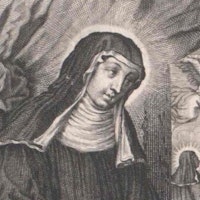I have always seen this light, in my spirit and not with external eyes, and I name it ‘the cloud of the living light.’ But sometimes I behold within this light another light which I name ‘the living light itself.’
Hildegard of Bingen

The Living Light Itself
Topic: Truth, Law, & Principle
From my infancy up to the present time, I now being over seventy years of age, I have always seen this light, in my spirit and not with external eyes, and I name it ‘the cloud of the living light.’ But sometimes I behold within this light another light which I name ‘the living light itself.’ And when I look upon it, every sadness and pain vanishes from my memory, so that I am again as a simple maid and not as an old woman.
Hildegard of Bingen (1098-1179) was a Benedictine abbess and mystic of medieval Germany. She was born into a noble family in Bermersheim vor der Höhe, Germany, and entered religious life at the age of eight. She received a rudimentary education, but at the age of forty-two, she began to experience a series of visions that would shape her life and work.
Hildegard described these visions as "the living light," and they were often accompanied by physical sensations such as heat, cold, and pain. She believed that these visions were a gift from God, and she felt called to share them with the world. She began to write down her visions, and she also composed music and poetry to express her spiritual insights.
Hildegard was a prolific writer, and her works cover a wide range of topics, including theology, natural science, medicine, and music. She is best known for her three volumes of visionary theology: Scivias, Liber Vitae Meritorum, and Liber Divinorum Operum. These works are rich in symbolism and imagery, and they offer a unique perspective on the nature of God, the human soul, and the world.
In addition to her writings, Hildegard was also a gifted musician and composer. She wrote over 70 songs, including the Ordo Virtutum, an early example of liturgical drama. Her music is characterized by its simple melodies and its use of plainchant.
Hildegard was a complex and multifaceted figure, and her work continues to inspire and challenge people today. She was a visionary, a mystic, a writer, a composer, a scientist, and a healer. She was also a woman of great courage and determination, and she used her gifts to make a difference in the world.
Hildegard of Bingen was a remarkable woman who left a lasting legacy. She was a pioneer in the fields of theology, natural science, and music, and her work continues to be studied and appreciated today. She was also a powerful voice for women's rights, and she challenged the patriarchal structures of her time. Hildegard of Bingen was a true visionary, and she continues to inspire us with her courage, her intellect, and her creativity.
Hildegard of Bingen. Quoted in Prayers for All People, by Mary Ford-Grabowsky, Doubleday, 1995.

Hildegard of Bingen
Theme: The Light of Truth

About This Hildegard of Bingen Quotation [Commentary]
Hildegard of Bingen’s description of divine light encapsulates a deep spiritual insight. She distinguishes between the “cloud of the living light” and a more profound “living light itself,” indicating layers of spiritual awareness. This vision, perceived inwardly rather than through physical senses, highlights an internal spiritual journey. Her experience aligns with the theme of “The Light of Truth,” suggesting that truth is a multi-layered, evolving experience, deepening with one’s personal spiritual journey.
In her context, Hildegard reflects on the transformative power of this light. She notes that the “living light itself” alleviates her sadness and pain, rejuvenating her spirit to a youthful state, irrespective of her physical age. This transformation underscores the timeless, age-defying nature of spiritual truth. The light of truth, as experienced by Hildegard, transcends physical limitations, embodying renewal and transformation.
Hildegard’s experiences echo a broader mystical tradition where divine union implies a connection with all of creation. Similarities can be drawn with other mystics like Julian of Norwich and Teresa of Ávila, who spoke of the resonance between the human soul and the divine universe. Hildegard’s inner light reflects this greater, universal light, suggesting that personal spiritual experiences resonate with a universal truth that permeates life and creation. Her insights reveal the Light of Truth as a universal principle, not just a personal revelation.
Eknath Easwaran—About Hildegard of Bingen
Richard Rohr, Hildegard of Bingen, Scivias [Excerpted from his commentary]
Visionary theology [Excerpt]
Additional Hildegard of Bingen Quotes
Resources
Related Quotes
Copyright © 2017 – 2025 LuminaryQuotes.com About Us